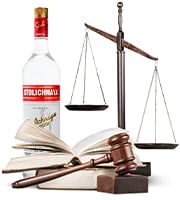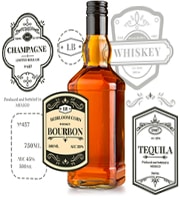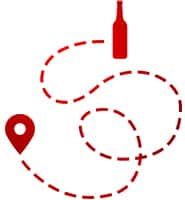How to Start an
Alcohol Import Business
– 2025 Edition
Free Alcohol Importer Toolbox
All the formulas and tools that Pro importers use to run a successful alcohol import business.
Start like a pro and avoid costly mistakes:
- Toolbox: Essential formulas and tools that professionals use to run their business.
- Startup Checklist: Step by step checklist to open and run your business.
- Essential Resources: Get access to tools, templates, and must-know regulations that will save you time and money.
Get it all Free for a limited time.
Get it FREE instantly!
Why Start an Alcohol Import Business?
In 2025, the allure of entering the alcohol import industry stems from the mounting global thirst for unique and artisan alcoholic beverages. This increasing trend is not just a momentary spike but shows signs of significant, sustained growth. Beyond the mainstream beer, wine, and spirits, there’s an expanding market for niche labels, local spirits, and craft options that promise exclusivity and authenticity.
The business of importing alcohol teems with potential for profit and expansion. While traditional domestic markets may seem saturated, there’s a dynamic landscape aboard ripe for exploration. Entrepreneurs can take this as a cue that diversifying into alcohol import could ensure a foothold in an otherwise competitive market. Scalability is a key factor here – start small with select brands and grow your portfolio as market presence solidifies.
Opportunity knocks for those ready to champion underrepresented drink categories. From rare gins to indigenous ales, international markets are a treasure trove of untapped liquid assets. With consumers becoming more experimental and conscientious about their choices, embracing these unique offerings could position a new alcohol import business at the forefront of a lucrative trend. In essence, 2025 presents a strategic moment to venture into the world of alcohol imports, capitalizing on the blend of burgeoning demand and the appeal of discovery in the world of spirits.

Step 1: Researching the Alcohol Import Market
An understanding of the current dynamics within the alcohol industry is critical for launching a successful import business. Examine trends such as the rising demand for craft spirits and an increasing interest in low-alcohol beverages. These trends can inform the selection of products to import and help in tailoring your business strategy.
Furthermore, pinpoint your target markets and delve into regional consumer preferences. Does a particular area favor whiskey while another shows a penchant for fine wine? Identifying these preferences is fundamental to positioning your alcohol import offerings effectively.
To solidify your research, employ a variety of market research tools and review trade publications. These resources are invaluable in revealing market gaps that your business can aim to fill. Understanding supply chain complexities, import duties, and the competitive landscape are also crucial aspects of your market research and should not be overlooked. By analyzing this information, you can establish a foundation that will inform your business decisions moving forward.
Alcohol Import Licensing
Contact Us
CONTACT US
Table of contents:
- Why Start an Alcohol Import Business?
- Researching the Alcohol Import Market
- Legal Requirements and Licensing
- Sourcing Your Products
- Navigating Import Logistics
- Setting Up Distribution Channels
- Branding and Marketing Strategies
- Financial Management and Scaling Up
- Common Challenges and How to Overcome Them
- Conclusion: Seizing Opportunities in the Alcohol Import Industry
- FAQ: Starting an Alcohol Import Business
- Resources for Starting an Alcohol Import Business

Step 2: Legal Requirements and Licensing
Key to this is the Alcohol and Tobacco Tax and Trade Bureau, commonly known as the TTB, which oversees national regulations. The TTB application process begins with registering your business and securing a Basic Permit. This involves thorough background checks and financial vetting to ensure compliance with federal guidelines. It’s crucial to have all your documentation in order, including detailed business plans and evidence of contractual agreements with foreign suppliers.
Your journey doesn’t end with federal approval; each state sets its own licensing puzzle pieces in place. These vary widely, with some states leaning on the lenient side, while others uphold a stringency that can feel overwhelming. It’s imperative to research and adhere to your specific state’s requirements, which could include additional permits or adherence to distinct distribution laws. Partnering with a legal expert who specializes in alcoholic beverage laws can streamline this process, ensuring that you’re ticking all the necessary boxes without unnecessary delays.
Once you’re ready to start you can contact Rezzonator Services, the leader in alcohol import licensing, for a free consultation with your specific situation.
Step 3: Sourcing Your Products
A pivotal step is forging robust relationships with international producers and distilleries. These connections are the bedrock of your inventory; they determine the diversity and quality of alcoholic beverages you’ll bring to the market. Prioritize transparency and trust in these relationships to ensure a consistent supply of exceptional products.
To uncover distinctive liquors that set your portfolio apart, attending trade fairs and virtual expos is invaluable. These events are hubs for the latest trends and products in the industry. They offer a unique opportunity to sample new offerings, meet producers face-to-face, and gather insights into the tastes and preferences shaping the market.
Negotiating contracts with foreign suppliers requires a blend of finesse and acumen. To sidestep common pitfalls, do your due diligence on market prices and legal requirements. Be clear about your expectations, and ensure contracts are comprehensive, covering aspects like payment terms, delivery schedules, and quality standards. Remember, a well-negotiated contract is your safeguard against future uncertainties and is crucial for a smooth-running import business.

Step 4: Navigating Import Logistics
Customs clearance entails a thorough process where your imported alcohol is reviewed by the customs authority. At this juncture, several tariffs and taxes come into play, which are essentially the costs levied on your goods based on their value and type. Understanding and accurately anticipating these costs are crucial, as they directly impact your bottom line.
Working with freight forwarders and customs brokers can simplify this intricate process. Freight forwarders are experts in managing logistics and can ensure that your alcohol shipments are efficiently transported. Customs brokers, on the other hand, are your guiders through the red tape, adept at handling the numerous documents required for clearance and ensuring compliance with all regulations.
To mitigate the risk of delays, a pro-tip is to familiarize yourself with seasonal shipping trends. For instance, during holiday seasons, shipment volumes surge, which can prolong delivery times. By planning your orders to avoid peak seasons, or by allowing extra time if avoidance is not possible, you can maintain a steady flow in your business operations. In essence, understanding and planning around these dynamics are critical for a timely and cost-effective import process.
Step 5: Setting Up Distribution Channels
At the core of a successful alcohol import business is an efficient distribution system. When considering distribution options, it’s imperative to scrutinize the profit margins associated with each method. Partnering with local distributors can significantly broaden your reach and streamline logistics, albeit often at the cost of relinquishing a share of your profits. On the other hand, self-distribution may demand more hands-on effort but can result in higher profit margins by cutting out the middleman.
In today’s digital-centric world, leveraging e-commerce platforms offers a direct route to consumers and expands your sales territory beyond traditional brick-and-mortar limitations. Utilizing these platforms can simplify international sales and open new markets. Additionally, social media networks have become a potent tool for marketing and sales, offering a platform for targeted advertising and customer engagement.
To solidify your presence in the market, robust marketing strategies are non-negotiable. Establishing brand awareness is not just about being seen—it’s about creating a connection with your audience. Effective marketing communicates your brand’s story, values, and uniqueness, convincing consumers to choose your products over competitors’. Crafting a strong brand image and maintaining a consistent marketing message across all channels can magnetize potential customers and cultivate loyalty.

Step 6: Branding and Marketing Strategies
In the competitive landscape of alcohol import businesses, crafting a compelling brand story is paramount. This narrative sets your offerings apart and fosters an emotional connection with your audience. Establish your unique selling points—be it heritage, crafting methods, or exclusive ingredients—to create a memorable brand impression.
To ensure your brand reaches the targeted demographic, digital marketing is vital. Utilizing SEO to enhance online visibility, engaging with customers on social media platforms, and employing email marketing strategies can lead to a robust online presence. Moreover, collaborations with influencers and the organization of pop-up events can significantly amplify your brand, creating buzz and fostering direct interactions with potential customers.
Rezzonator Marketing can help get your brand known.
When it comes to packaging, aesthetics and legal compliance go hand in hand. Investing in eye-catching packaging and label design contributes to shelf appeal and brand recognizability. However, it’s essential to ensure that your labels adhere to U.S. Alcohol and Tobacco Tax and Trade Bureau (TTB) regulations. Familiarity with rules surrounding labeling will prevent legal issues and establish consumer trust in your brand authenticity and reliability.
Step 7: Financial Management and Scaling Up
Budgeting is key, both for initial costs and for ongoing cash flow. Start-up expenses such as licensing, marketing, and purchasing inventory need careful planning. Ensure that funds are allocated to maintain operations without cash shortages, and assess your financial health regularly to avoid unexpected deficits.
As profits begin to trickle in, reinvesting them wisely accelerates business growth. Expanding your product portfolio not only diversifies risk but can attract a broader customer base. This strategy is paramount for standing out in a competitive market.
To scale your alcohol import business, consider several avenues: tapping into new geographical markets and demographics, or forging exclusivity agreements with sought-after brands. These moves can cement your business as a notable entity in the alcohol import industry. Remember, scaling up is a step-by-step process; each expansion should be sustainable and backed by a concrete financial plan.

Step 8: Common Challenges and How to Overcome Them
Unexpected events can impact the movement of goods across borders, creating delays and logistical nightmares. To mitigate these issues, it’s crucial to establish strong relationships with reliable logistics partners and maintain open communication with suppliers. Stay informed on regulatory changes and secure the services of a knowledgeable customs broker to streamline compliance.
Managing customer expectations is another hurdle worth noting. Your business’s reputation hinges on your ability to meet demands consistently. To foster trust, be transparent with clients about potential delays and provide realistic delivery timelines. Building a resilient business model is vital for sustainability. Diversify your supplier base to avoid over-reliance on a single source and consider multiple shipping routes to maintain a steady flow of products.
Learning from those who’ve weathered the storm is beneficial. Consider how established importers handle setbacks by keeping ample stock to buffer against supply chain issues, or how they invest in sophisticated tracking systems for real-time inventory management. They often prioritize customer service to resolve disputes quickly and efficiently, preserving customer loyalty. Through strategic planning and adopting best practices, your alcohol import venture can not only confront challenges but thrive despite them.
Conclusion: Seizing Opportunities in the Alcohol Import Industry
In the journey to launching your alcohol import business, we’ve tackled the essentials: from navigating legalities to understanding international trade dynamics. Summarizing these key steps, begin with securing the required licenses and permits. Select your target market carefully and establish solid relationships with both domestic and foreign stakeholders. Remember, selecting the right suppliers and adhering to import regulations is crucial for a fluid operation.
Next, marketing prowess is essential. Positioning your business to meet consumer demands and tapping into emerging market trends can provide a competitive edge. Your strengths could lie in a unique product selection, a commitment to sustainable practices, or unparalleled customer service. By capitalizing on such attributes, your business can carve out a unique niche in the bustling alcohol import sector.
Finally, It’s time for action. Making the leap into the alcohol import industry might seem daunting, but it’s laden with opportunities for the persistent and savvy entrepreneur. Equip yourself with the knowledge from each step we’ve discussed and channel your passion into creating a strategy for your business. Now is the moment to take the first steps. With determination and by leveraging your unique strengths, you have the potential to build a thriving alcohol import business. Begin today—your future as a global alcohol connoisseur awaits.
FAQ: Starting an Alcohol Import Business
1. What licenses are required to import alcohol into the United States?
- You need a federal permit from the Alcohol and Tobacco Tax and Trade Bureau (TTB).
- State-specific licenses are also required, and these vary depending on your state of operation.
- In some cases, local permits may also be necessary.
2. How long does it take to get licensed to import alcohol?
- The TTB application process can take up to 90 days for approval.
- State licenses may require additional processing time, ranging from a few weeks to several months.
- Consider temporary permits, where available, to start operations sooner.
3. What types of alcohol are most profitable to import?
- Craft spirits and artisanal beverages often have higher profit margins due to consumer interest in unique products.
- No-/low-alcohol options are growing in popularity and represent an emerging market.
- Premium wines and liquors with a strong brand identity tend to perform well.
4. What are the key logistics considerations when importing alcohol?
- Understand customs regulations, tariffs, and taxes for alcohol imports.
- Work with reliable freight forwarders and customs brokers to avoid delays.
- Plan shipments carefully to account for seasonal trends and demand surges.
5. How can I find reliable international suppliers?
- Attend trade fairs, expos, and virtual industry events to network with producers.
- Research suppliers’ backgrounds and request samples to assess quality.
- Use references from trusted industry contacts to identify reputable partners.
6. What are some common challenges faced by alcohol importers?
- Supply chain disruptions and delays in shipping.
- Compliance with complex U.S. and international regulations.
- Building brand recognition in a competitive market.
7. How much capital do I need to start an alcohol import business?
- Initial costs can vary but typically include licensing fees, shipping expenses, and marketing budgets.
- Small-scale operations can start with $10,000–$50,000, while larger ventures may require more capital.
- Explore funding options like small business loans or investor partnerships to cover costs.
8. What marketing strategies work best for promoting imported alcohol?
- Create a compelling brand story to connect with your audience.
- Leverage social media, influencer partnerships, and targeted advertising.
- Host tasting events or pop-ups to introduce your products to potential customers.
9. Can I sell imported alcohol directly to consumers?
- Direct-to-consumer sales are allowed in some states but require additional licensing.
- Using e-commerce platforms can be an effective way to reach customers, but you must comply with shipping laws for alcohol.
- Always verify state regulations for direct alcohol sales before proceeding.
10. What are some tips for scaling an alcohol import business?
- Expand your product portfolio by introducing new brands and categories.
- Enter new geographic markets to increase your customer base.
- Invest in marketing and distribution to build a strong brand presence.
Resources for Starting an Alcohol Import Business
1. Rezzonator Services: Alcohol Licensing Experts
- Rezzonator Services specializes in alcohol import licensing and consulting, offering comprehensive services to navigate the complexities of the industry.
2. Importing Alcohol Licenses
- Get Your Alcohol Import License: A Comprehensive Guide for Wine, Beer & Liquor Importing – This guide provides detailed information on obtaining the necessary permits for importing various alcoholic beverages.
- Alcohol Import License Essentials – Learn about the fundamental requirements and considerations for securing an alcohol import license.
3. Combining Import and Wholesale Licenses
- Spirits, Beer or Wine Importer and Wholesaler – What to Avoid – Understand the benefits and potential pitfalls of holding both import and wholesale licenses.
4. Specific Import Guides
- How to Import Liquor into the US – A detailed guide on importing spirits like whiskey, vodka, and tequila.
- Importing Beer into the United States – Insights into the beer importation process, including logistics and compliance.
5. Compliance and Labeling
- Compliance Services – Rezzonator Services offers expertise in ensuring your business adheres to all regulatory requirements, helping you avoid penalties and operational disruptions.
- Labels & COLAs – Assistance with obtaining Certificates of Label Approval and ensuring your product labels meet all legal standards.
6. Consulting and Additional Services
- Expert Liquor License Consultant – Professional guidance on navigating the licensing process and developing market strategies.
- Contact Rezzonator Services – Reach out for personalized assistance tailored to your specific business needs.
GET STARTED
- Import Alcohol Licensing Experts
- Hundreds Of Cases Approved
- FREE Consultation

